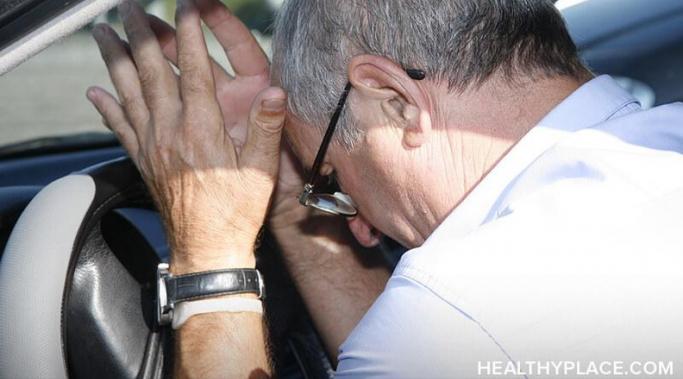The holiday season of 2013 was the worst of my life. I was grieving the end of a relationship. I was mourning my independence because I had to move back in with my parents. I was suicidal. I was broke. All in all, I felt like a disaster. But I got through it. I wasn't sure I was going to, but I did. It was, however, one of the loneliest times of my life.
Treating Anxiety
Do you ever have days when you swear people are acting hostile, rude, or just downright weird? I'm a cashier at a grocery store, so I see all kinds of social behavior "in the wild," so to speak. And yes, I'm aware that my anxiety can warp my perception of other people, but that can't completely explain how some people act on occasion.
It seems like there is a lot of discussion these days about self-medicating for anxiety. For those who aren't familiar with the term, self-medicating generally means using alcohol or other recreational drugs like marijuana to manage the symptoms of anxiety. It's also possible to self-medicate with behaviors like eating, shopping, gambling, and sex. The overall position within most mental health communities -- including HealthyPlace -- is that self-medicating is generally a bad idea. While I don't disagree, I think the topic is more complex than it appears, especially when you factor in addiction.
It's not exactly news that living with anxiety can warp our perceptions of other people, especially their intentions toward us. Social anxiety can make the world, and the people in it, seem mean-spirited, harsh, or even cruel. For me, I judge others in a very negative light when I'm in the grip of a particularly severe episode of anxiety. I expect the worst from people, and am still often surprised when I don't actually get it. That's because most people are significantly nicer than my anxious brain's perception would have me believe. The good news is, I'm getting better at remembering this while it's happening and social anxiety doesn't warp my perceptions as often or as severely as it once did.
This week, the walls of anxiety are closing in. The world appears absolutely insane, and I feel like a dog in a plastic kennel that's too small, pacing and turning in an ever-tightening circle.
I have no anxiety tips, tricks, or techniques for you this week, because I feel like absolute crap. I seem to always make videos or audio posts when I'm in crisis too. I don't know why that is.
We live in a performance-based society, as any adult can tell you. Our culture is actually much more interested in what someone can do rather than who they are. And yet, our social values of individualism, freedom, self-expression, and "believing in yourself" are among our most cherished ideals.
We encourage children to dream big about who they want to be when they grow up, telling them they can become anything they desire. So, naturally, they dream of being astronauts, pop stars, doctors, firefighters, and sports figures. Some kids want to skip the whole career thing and just be rich and famous.
Isn't it ironic that kids fantasize about growing up to have some of the most performance-based professions on earth?
Does the term meditation make you instantly seize up? I do. I'm guessing I'm not alone on this one.
And yet meditation really can help ease the symptoms of anxiety and other various mental health issues, including the common one of struggling with focus. Hmm. What to do? How about making the act of meditating easier and shorter? Short is good.
I've got generalized anxiety disorder (GAD), and I've also got some serious issues with concentration. As in, my ability to concentrate on almost anything for more than five minutes at a time stinks. There are some days when I can barely string two coherent thoughts together, and I swear my brain is turning into mush.
While it's true that a lot of peripheral detail goes by the wayside, I have a core self that functions reasonably well in the world despite the stress of managing anxiety. Maybe I'm also just getting more comfortable with being a middle-aged slob. I don't know. But I consider myself lucky that I function as well as I do. I know lots of others aren't so lucky.
I've been skeptical about helpful quotes and positive affirmations for a long time. To me, they smack of the denial present in some forms of positive thinking: keep up a cheerful facade, and everything will be fine.
I'm not down with this type of philosophy. Anxious people with low self-esteem also need the freedom to acknowledge their struggles in a safe environment, free from judgmental stigma and the oppression of relentless optimism. Sometimes, we need to talk about how not fine everything is.
However, some people swear by the power of positive affirmations. An enormous self-help movement, from Louise Hay to Tony Robbins, has been built on the premise that positive statements about ourselves not only make us feel better, they can heal our lives/minds/bodies/souls/children/parents/goldfish. Oh, and our dogs, too.
So, do positive affirmations really help repair our sense of self-worth? Well, it depends.
Work anxiety is a common issue for many with an anxiety disorder. In fact, it can be so debilitating for some that they're not able to work at all.
In this video, I interview a friend who works in the medical field, one of the most stressful work environments there is. What's the main way he copes with anxiety at work? Turns out, it's mostly good self-care.









